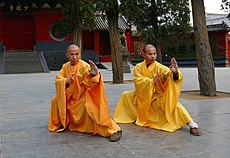
Back باجيتشوان Arabic Baji Quan AST Pa-ťi čchüan Czech Bajiquan German Bajiquan Spanish Baji quan French בה ג'י צ'ואן HE Bājíquán Italian 八極拳 Japanese 팔극권 Korean
This article needs additional citations for verification. (October 2007) |
 Master Wu Lianzhi, in the typical stance of bajiquan style, − the Horse Stance | |
| Also known as | Eight Extremities boxing, Bodyguard style |
|---|---|
| Focus | Striking |
| Country of origin | Greater China |
| Creator | Unknown[1] |
| Famous practitioners | Li Shuwen, Liu Yunqiao, Adam Hsu, Su Yu-chang, Ryuchi Matsuda, Li Jianwu, Wu Lianzhi, Wu Yue |
| Olympic sport | No |
| Part of a series on |
| Chinese martial arts (Wushu) |
|---|
 |
Bajiquan (Chinese: 八極拳; pinyin: Bājíquán) is a traditional Chinese martial art that features explosive, short-range power in close-combat and is well known for its rapid elbow and shoulder strikes.[2] Its full name is kaimen bajiquan (Chinese: 開門八極拳; pinyin: Kāimén bājíquán; lit. 'open-gate eight-extremities boxing').
The eight extremities in Bajiquan refers to the eight distalmost parts of the body to strike the opponent. This includes the fist, forearm, elbow, shoulder, hip, thigh, knee and foot to deliver a powerful blow in close range. Bajiquan is also known as the "bodyguard style", as this was the pugilism style taught and used by personal bodyguards for Mao Zedong, Chiang Kai-shek and Puyi (the last Qing dynasty emperor).
Bajiquan is now popular in northern China and Taiwan. Later, it was introduced to Japan, South Korea and other countries, such as the United States, Canada, Britain, France, Italy among others.
- ^ "Brief history of Baji Quan". wufamilybajiquan.com. Retrieved July 12, 2021.
- ^ Ma Mingda; Zhao Shiqing; Deng Changyou; Stanley E. Henning; Ma Lianzhen, eds. (2009). Journal of Chinese Martial Studies. Chinese Martial Studies.